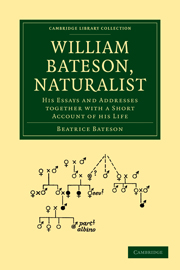Book contents
- Frontmatter
- Contents
- MEMOIR
- Hybridisation and Cross-breeding as a Method of Scientific Investigation
- Problems of Heredity as a subject for Horticultural Investigation
- An Address on Mendelian Heredity and its application to Man. Delivered before the Neurological Society, London, I. ii. 1906
- Gamete and Zygote. A Lay Discourse. The Henry Sidgwick Memorial Lecture, 1917
- Heredity and Variation in Modern Lights
- Presidential Address to the Zoological Section, British Association: Cambridge Meeting, 1904
- Presidential Address to the Agricultural Subsection, British Association: Portsmouth Meeting, 1911
- Presidential Address to the British Association, Australia: (a) Melbourne Meeting, 1914. (b) Sydney Meeting, 1914
- The Methods and Scope of Genetics. Inaugural Lecture delivered 23 October 1908. Cambridge
- Biological Fact and the Structure of Society. The Herbert Spencer Lecture, 28 February 1912. Oxford
- Science and Nationality. Presidential Address delivered at the Inaugural Meeting of the Yorkshire Science Association
- Common-sense in Racial Problems. The Galton Lecture
- Evolutionary Faith and Modern Doubts. Address to American Association for the Advancement of Science. Toronto, 1922
- Progress in Biology. An Address delivered March 12, 1924, on the occasion of the Centenary of Birkbeck College, London
- EDUCATIONAL ESSAYS
- REVIEWS
- APPENDIX
- INDEX OF PERSONS
- INDEX OF SUBJECTS
- PLATES I-III (Figs. 1-6) to Mendelian Heredity and its application to Man
Biological Fact and the Structure of Society. The Herbert Spencer Lecture, 28 February 1912. Oxford
Published online by Cambridge University Press: 07 September 2010
- Frontmatter
- Contents
- MEMOIR
- Hybridisation and Cross-breeding as a Method of Scientific Investigation
- Problems of Heredity as a subject for Horticultural Investigation
- An Address on Mendelian Heredity and its application to Man. Delivered before the Neurological Society, London, I. ii. 1906
- Gamete and Zygote. A Lay Discourse. The Henry Sidgwick Memorial Lecture, 1917
- Heredity and Variation in Modern Lights
- Presidential Address to the Zoological Section, British Association: Cambridge Meeting, 1904
- Presidential Address to the Agricultural Subsection, British Association: Portsmouth Meeting, 1911
- Presidential Address to the British Association, Australia: (a) Melbourne Meeting, 1914. (b) Sydney Meeting, 1914
- The Methods and Scope of Genetics. Inaugural Lecture delivered 23 October 1908. Cambridge
- Biological Fact and the Structure of Society. The Herbert Spencer Lecture, 28 February 1912. Oxford
- Science and Nationality. Presidential Address delivered at the Inaugural Meeting of the Yorkshire Science Association
- Common-sense in Racial Problems. The Galton Lecture
- Evolutionary Faith and Modern Doubts. Address to American Association for the Advancement of Science. Toronto, 1922
- Progress in Biology. An Address delivered March 12, 1924, on the occasion of the Centenary of Birkbeck College, London
- EDUCATIONAL ESSAYS
- REVIEWS
- APPENDIX
- INDEX OF PERSONS
- INDEX OF SUBJECTS
- PLATES I-III (Figs. 1-6) to Mendelian Heredity and its application to Man
Summary
There are signs that the civilised world is at length awakening to the fact that the knowledge needed for the right direction of social progress must be gained by biological observation and experiment. Such a turn in public opinion would, we may be sure, have been viewed by Herbert Spencer with exceptional interest and approval. The truth, so obvious to the naturalist, that man is an animal, subject to the same physical laws of development as other animals, is a doctrine he constantly expounded, and perhaps his teaching did more than that of any other philosopher towards helping men to see themselves as they really are, stripped of the sanctity with which superstition and ignorance have through all ages invested the human species.
Spencer not only contributed that great service, but I suppose that no one ever looked forward with serener confidence or a fuller optimism to the consequences which follow upon a recognition of these natural facts, to the possibility of a further evolution of our species, and to the certainty that by his own action the destiny of man may be controlled. It is natural therefore that in a lecture founded to commemorate his work we should examine the possibilities of biological discovery as applied to the constitution and future of human society.
- Type
- Chapter
- Information
- William Bateson, NaturalistHis Essays and Addresses Together with a Short Account of His Life, pp. 334 - 355Publisher: Cambridge University PressPrint publication year: 2009First published in: 1928

